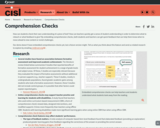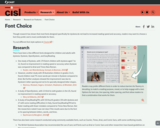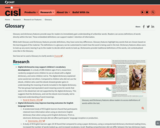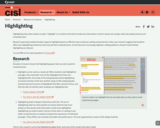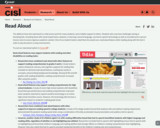
Accessibility
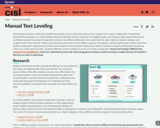
Find out more about text leveling, where text is modified to be more simple or complex to fit a student's reading skills.
- Subject:
- Education
- Material Type:
- Teaching/Learning Strategy
- Author:
- CISL
- Date Added:
- 12/13/2021
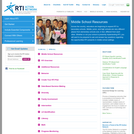
Across the country, educators are beginning to expand RTI to secondary schools. Middle, junior, and high schools are very different places from elementary schools and, in fact, different from each other. Whether or not your school is presently implementing RTI, you will want to be prepared to ask and answer key questions regarding the opportunities RTI presents in high school settings.
- Subject:
- Education
- Special Education
- Material Type:
- Reading
- Teaching/Learning Strategy
- Provider:
- National Center for Learning Disabilities, Inc.
- Provider Set:
- RTI Action Network
- Date Added:
- 02/01/2014
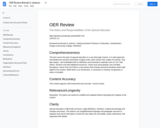
https://granite.pressbooks.pub/edu606-701/
- Subject:
- Education
- Special Education
- Material Type:
- Teaching/Learning Strategy
- Author:
- Brenda G Jackson
- Date Added:
- 07/19/2022
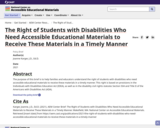
The purpose of this brief is to help families and educators understand the right of students with disabilities who need accessible educational materials to receive these materials in a timely manner. This right is based on provisions in the Individuals with Disabilities Education Act (IDEA), as well as in the disability civil rights statutes Section 504 and Title II of the Americans with Disabilities Act (ADA).
- Subject:
- Education
- Material Type:
- Primary Source
- Author:
- National Center on Accessible Educational Materials
- Date Added:
- 08/11/2022
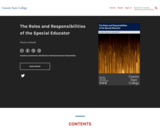
The book is designed to accompany an introductory level general special education course: The Dynamic Role of the Special Educator.
- Subject:
- Education
- Special Education
- Material Type:
- Full Course
- Provider:
- Granite State College
- Author:
- Paula Lombardi
- Date Added:
- 03/10/2021

Are you new to accessibility? This resource is meant to be your entry point into the creation of accessible content with familiar tools such as Microsoft Office and Google Docs. You will learn about five practices that can have a significant impact on the learner experience for all students, especially those who rely on assistive technology for their access to the curriculum.
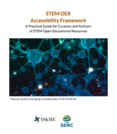
This guidebook was created by ISKME, in partnership with the Science Education Resource Center (SERC) at Carleton College. The document provides a practical reference for curators and authors of STEM OER, and contains 23 accessibility criteria, or elements, to reference as they curate, design and adapt materials to be accessible for STEM learners.
The primary audience of this resource is STEM postsecondary faculty, instructional designers, and others responsible for course design and pedagogy who seek to:
- Expand their knowledge about accessibility and ways to integrate it into their STEM curriculum and instruction
- Design openly licensed STEM courses and course materials that support both access and use by learners
- Curate existing STEM content that expands upon traditional textbooks and courseware to address variability in learning
- Identify and add meaningful keywords, or tags, to the STEM OER they create, so that their OER can be more easily discovered across platforms
Professional learning teams on campus are also encouraged to use this framework as part of training to facilitate integration of accessibility concepts into STEM course design and pedagogy.
The framework and guide development was supported by a mini-grant program facilitated by Bates College and the SCORE-UBE Network (Sustainability Challenges for Open Resources to promote an Equitable Undergraduate Biology Education), with funding from The William and Flora Hewlett Foundation. The framework and guide were developed by ISKME and SERC with input from 21 STEM faculty members from across the United States, and in collaboration with the project’s Working Group of accessibility experts: Andrew Hasley and Hayley Orndorf, both with BioQUEST’s UDL Initiative and the Quantitative Undergraduate Biology Education and Synthesis (QUBES) Project; Hannah Davidson, Plymouth State University; and Cynthia Curry, National Center on Accessible Educational Materials (AEM)/CAST.
- Subject:
- Education
- Material Type:
- Reading
- Teaching/Learning Strategy
- Author:
- Carlton College
- SERC
- ISKME
- Date Added:
- 01/19/2021
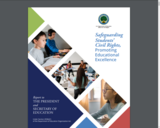
This report is submitted under Section 203(b)(1) of the Department of Education Organization Act of 1979, Pub. L. No. 96–88, which provides: “The Assistant Secretary for Civil Rights shall make an annual report to the Secretary, the President, and the Congress summarizing the compliance and enforcement activities of the Office for Civil Rights and identifying significant civil rights or compliance problems as to which such Office has made a recommendation for corrective action and as to which, in the judgment of the Assistant Secretary, adequate progress is not being made.” 20 U.S.C. §3413(b)(1
- Subject:
- Education
- English Language Arts
- Speaking and Listening
- Material Type:
- Primary Source
- Author:
- U.S. Department of Education
- Date Added:
- 08/15/2022
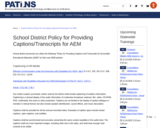
──────────Description: Weekly support for the PATINS AEMing for Achieving Grant on Assistive Technology, Accessible Educational Materials, and Universal Design for learning.School Corporation: School Town of MunsterClosed consultation. If you would like to request a consultation on this topic, please submit the IDOE's Technical Assistance Request Form. This form is required before PATINS is permitted to provide you with support. We strongly value your assistance in fulfilling this state requirement. Your responses on the IDOE's form are necessary to be able to provide you support now, but it's also critical to be able to sustain PATINS services at no cost in the future. It shouldn't take much of your time and it's important for you to state in the notes that you're already working with PATINS.
- Subject:
- Education
- Special Education
- Material Type:
- Primary Source
- Author:
- Jennifer Conti
- Date Added:
- 11/23/2022
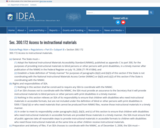
IDEA Section 300.172 Access to Instructional Materials
- Subject:
- Education
- Special Education
- Material Type:
- Primary Source
- Author:
- IDEA
- Date Added:
- 08/04/2022
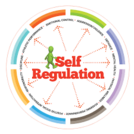
This is a parenting tool to be sent for support with reducing impulsive speech at home.
- Subject:
- Early Childhood Development
- Psychology
- Special Education
- Material Type:
- Activity/Lab
- Author:
- Fareeda Taha
- Date Added:
- 03/31/2022
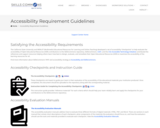
Resources to help TAACCCT grantees learn how best to design, evaluate, and remediate their Open Educational Resources (OER) to maximize the accessibility of the learning resources for all.
- Subject:
- Education
- Material Type:
- Teaching/Learning Strategy
- Provider:
- CAST - AEM Center
- Author:
- AEM Center
- Date Added:
- 09/23/2021
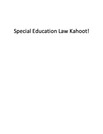
This game is designed to test, reinforce, and enhance students' understanding of Special Education Law. I've used it in several different ways: as a game that students play in class, with a prize for the winning student or team (playing the game and discussing the correct answers takes about one hour of class time); as a closed-book quiz that students take in class, followed by discussion of the correct answers (again, about one hour of class time); and as an open-book assignment that students complete before class, followed by discussion of the correct answers in class (about 30 minutes of class time).
- Subject:
- Education
- Law
- Special Education
- Material Type:
- Activity/Lab
- Assessment
- Game
- Homework/Assignment
- Author:
- David Moss
- Date Added:
- 09/04/2022
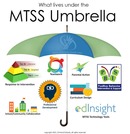
This resource is for pre-service teachers who are learning about special education and the Response to Intervention (RTI) and the Multi-tiered System of Supports (MTSS).
- Subject:
- Special Education
- Material Type:
- Diagram/Illustration
- Reading
- Author:
- Jeanne Burth
- Date Added:
- 04/15/2020
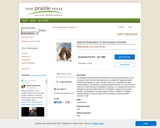
This textbook provides information on the practice of teaching special education in the secondary schools. Research-based practices are explained for supporting student functioning in language arts, math, and other content areas. Specifically, the eight chapters address: (1) Introduction to secondary special education; (2) Curriculum-based measures to inform learning; (3) Strategies for working in a co-teaching environment; (4) Strategies for improving student behavior; (5) Strategies to support post-secondary transition; (6) Strategies for improving student outcomes in reading; (7) Strategies improving student outcomes in writing; and (8) Strategies for improving student outcomes in math.
- Subject:
- Education
- Special Education
- Material Type:
- Textbook
- Provider:
- New Prairie Press
- Author:
- Mickey Losinski
- Date Added:
- 12/06/2017
